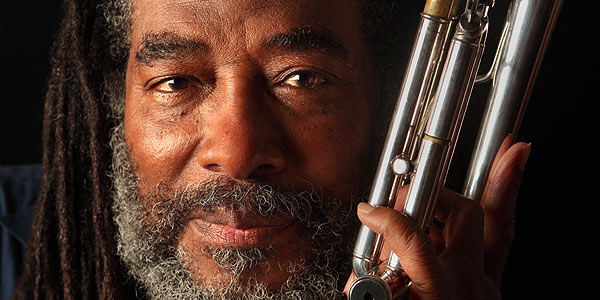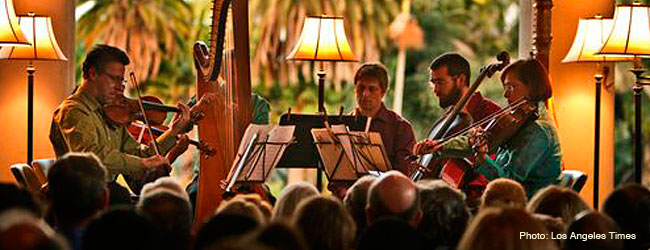
Wadada Leo Smith’s opus
The composer examines America's racial struggle in
‘Ten Freedom Summers’ over three days at REDCAT.

Wadada Leo Smith. (Carolyn Cole, Los Angeles Times / September 12, 2011)
By Greg Burk, Special to the Los Angeles Times
October 23, 2011
Composer Wadada Leo Smith will unleash his magnum opus — a three-night abstract investigation of American racial struggle — at REDCAT next weekend. As an African American born in Mississippi in 1941, he's qualified.
"When you live in the South, you're constantly part of the civil rights movement," he says. Although he's talking on the phone from Connecticut, where he's visiting family, his physicality and quiet insistence permeate the conversation as he tells an illustrative story from his time as a teenage musician in Leland, Miss.,
in the 1950s.
"I was walking home late at night in the downtown area. A car came swiftly and a bunch of white boys got out, intending to do damage to me. Nobody else was on the street. One of the boys recognized me and said, 'That's Leo. He plays at the country club.' They all got back in the car and left."
Smith knows that Emmett Till (murdered in 1955 for flirting with a white woman) and Medgar Evers (killed for his activism in 1963) weren't so fortunate. So on and off for 34 years, such moments have led him to create the 18 compositions that constitute "Ten Freedom Summers" — his tribute (inspired by playwright August Wilson's racially centered "The Pittsburgh Cycle") to the major figures in African Americans' march toward equality.
Less a story than a nonverbal gestalt in which powerful personalities and social forces interact, "Summers" offers "inquisitive psychological examinations" of figures such as Dred Scott, Rosa Parks, Justice Thurgood Marshall and the Rev. Martin Luther King Jr.
"Wadada was absolutely right when he told me, 'It's time for these people to become American heroes, not just African American heroes,'" Jeff von der Schmidt, founding artistic director and conductor of Southwest Chamber Music, says at a coffee house near his Pasadena office. Von Der Schmidt's nine-member ensemble will collaborate on "Summers" with Smith's latest Golden Quartet (trumpeter Smith, pianist Anthony Davis, bassist John Lindberg and drummer Susie Ibarra).
Von Der Schmidt met Smith in 1998 at CalArts, where Smith had recently come to teach. At the time, Von Der Schmidt didn't know of Smith's l status in the world of improvisational music as a member of Chicago's Assn. for the Advancement of Creative Musicians, wherein revolutionary thinkers such as Muhal Richard Abrams, Roscoe Mitchell and Anthony Braxton applied sound as a lever for social change. He was impressed.
Smith and Von Der Schmidt worked together sporadically. Then, last year, when Von Der Schmidt was seeking pieces to celebrate Southwest Chamber's 25th anniversary, he checked in with Smith.
Exhausted after Southwest Chamber's ambitious Vietnam exchange project (the latest of several far-reaching multicultural efforts), Von Der Schmidt visited Smith's Ventura home, where the two splayed reams of sheet music all over the floor. He drove home realizing he might well stage not the usual 15-minute composition but what he calls Smith's African American equivalent of Wagner's "Ring" cycle.
"My defenses were down," he says with a shrug.
Von Der Schmidt remains obviously thrilled that he recognized opportunity's knock. Waving his mug recklessly, his eyes glazed with zeal behind wire-rim specs, he slaps the coffee table with page after page of staff paper.
His scrawled arrows swoop down from one C-sharp to another, delineating the continuity of a particular character. He has organized what he calls Smith's "ironic" harmonies into vertical stacks. He has sketched out the interactions between Smith's Golden Quartet and his own nonet — the beginnings of a full score that every musician, in conformity with Smith's method, will possess, so that each can grasp the totality and contribute appropriate tonalities and improvisations.
Smith's compositions present a particular challenge because he emphasizes proportion and expression rather than meter and key. Von Der Schmidt dismisses the difficulty, though; he and his players know Wadada's world through hands-on experience.
"We all speak Smith," Von Der Schmidt says. "Working on his music, I'm reminded that the word 'chromatic' comes from the Greek
chroma, which means 'color.' And I find a beautiful confirmation of all types of traditions — the blues tradition as well as the great chromatic tradition that goes back to Debussy and Bartôk."
The music won't be the only expansive aspect of "Ten Freedom Summers." Videographer Jesse Gilbert will manipulate live visuals triggered by computer interface. And each segment will be introduced by short historical background from Facing History and Ourselves, the organization that spearheaded the PBS documentary series "Eyes on the Prize." The music will also be recorded for release.
Smith and Von Der Schmidt toned their fund-raising muscles on "Ten Freedom Summers," resulting in support unprecedented for any of Smith's projects. Donations poured in from the National Endowment for the Arts, the Musicians' Assistance Program fund, the Doris Duke Charitable Foundation, the James Irvine Foundation, the Clarence E. Heller Charitable Foundation, the John Simon Guggenheim Foundation, Chamber Music America and Southwest Chamber Music.
And "Ten Freedom Summers" gives back: A production with such nonlinear scope opens windows for growth. For preparation, Smith recommends a listener spend an hour reading about the history, for which he has provided links at
wadadaleosmith.com on the "Ten Freedom Summers" page.
More important, though, says Smith, "Once you get in the theater, let your heart and mind receive the images and the information and the music. And if a person elects to take in all three days, I make a personal guarantee that at the end, when I perform 'Dr. Martin Luther King Jr.: Memphis, the Prophecy,' he or she will understand. Because that ending will tell the story of the whole movement."
"Ten Freedom Summers" sends an uplifting message. But the word "freedom" also harbors a dark subtext. "From now back to the past," says Smith, "we can observe clearly that none of us is free."
calendar@latimes.com

